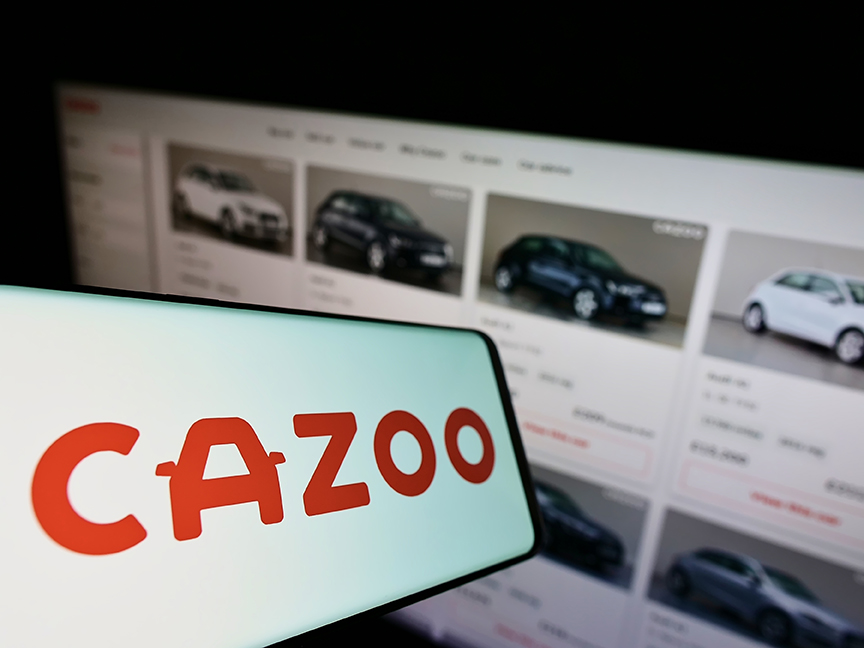Senior leaders say that the business plans to break even by December 2023 despite reporting spiraling losses. So what’s the future for the used car innovator Cazoo?
Is The Disruptive Approach to Buying Used Cars Flawed?
Companies House has publicly-listed records of every business in the UK, including details of yearly profits and losses. Started by Zoopla founder and serial entrepreneur Alex Chesterman OBE, Cazoo’s accounts for the year ending December 31, 2021 state that losses have plummeted to £329m. This is almost triple the £102.7m losses the business recorded in 2020.
The second-hand car website almost lost an average of £229 per unit in 2020. Fears have been raised that a cash crunch it may go the way of its one time rival Cazam. That firm launched with big plans but shortly after failed to raise more capital and was placed into administration. However, the signs aren’t all bad for Cazoo. It now records a profit for every vehicle sold, an average of £427 gross profit per unit.
If your business buys, sells, repairs or modifies vehicles then Plan Insurance Brokers can source a tailored Motor Trade insurance policy for you. If you have any more questions or would like a quote call our expert team, request a call back or fill in a quote form.
Is Cazoo on the way up or the way down?
Cazoo announced that the average unit profit is increasing thanks to more vehicles being sold. They credit this to improved internal systems, ‘reconditioning efficiencies, reducing days to sale and growing ancillary services’.
Average monthly users on the website have increased. It’s at 1.6m per month now, compared to 763, 000 in 2020. They believe this results from a smart investment in marketing and a rise in their brand recognition.
Cazoo’s competitor Cinch receives scathing coverage on BBC’s Rip-Off Britain
BBC consumer advice programme Rip Off Britain took shots at ‘Cinch’, another used car disruptor.
On the show presented by Julia Somerville, Angela Rippon and Gloria Hunniford, the online used car dealer was criticised. A paramedic bought two cars from the website, and both had serious problems.
The show, which aired in early October, highlighted historic issues with the second-hand car buying process that many consumers claim can make it a less-than-pleasant experience. The issuess normally focus on trips to grotty used-car showrooms followed by battles with overly pushy second-hand car salesmen.
Disruptors like Cazoo and Cinch claim they offer a more accessible and transparent alternative to that buying pattern. On top of that, the online marketplace gives customers the choice of thousands of cars available at any one time.
Lee’s experience of the 21st century used-car marketplace
Paramedic Lee bought an £18,000 2018 VW Golf model. It turned out that the vehicle had an issue with its battery. When recovery services came out to help him, they found that the previous owners had swapped the battery from an ageing model with the one in Lee’s car.
Lee had trusted Cinch because it boasted of a 225-point quality check. Lee was also disturbed to learn that the car had bodywork repairs done to it, as the recovery professional noticed issues with the paintwork.
Lee took the car back to Cinch, who were happy to refund him. He maintained faith in the used car website and paid another £4,000 for another car. This was hardly a better experience.
The new car had warning lights on the dash when it arrived, so he checked the 225-point paperwork. The car’s paperwork also said that it had a tow bar and a soft top, neither of which the car actually had.
‘This car should never have left the check centre,’ Lee said. He doubted if the Cinch team had inspected the car at all. Cinch tried to fix the problems, but the issues persisted.
Cinch said they would help with repairs, before telling him the car had expired out of its 90-day warranty. He felt that he had been left with a car that was never fit for purpose.
Cinch told the BBC that Lee’s case ‘did not meet its usually high standards’ and honestly admitted that the process took ‘longer to resolve than they would have liked’.
High profile cases of poor service such as this may cause unhappy customers to think fondly of the old-school way of buying used cars. Another dissatisfied customer said they’d rather, “Deal with a salesperson person-to-person, and I know what I’m buying’.
This begs the question of whether the disruptive used car marketplace model is sustainable and whether customers receive the level of service they deserve.
Cazoo’s plan for the future
Cazoo bosses have said that they aim to break even by the end of 2023, without further need for fundraising. They forecast a cash balance of over £100m. They are working on moving their operation out of Europe, which they think will save them save over £100m and reduce the need for further capital.
In February, they sold two customer collection centres for £13.7, opting for leasing instead of owning the sites.
In June, Cazoo underwent a savage project to cut costs and save £200m. This includes letting people go, closing sites and reducing their huge ad spend. Despite all of the cuts, Cazoo founder says he still believes Cazoo offers a superior buying experience for car buyers.
Cazoo leaders believe they are perfectly positioned to completely transform the experience of buying used cars across the whole of the UK. Most car dealers and prospective buyers will agree that this remains to be seen.


